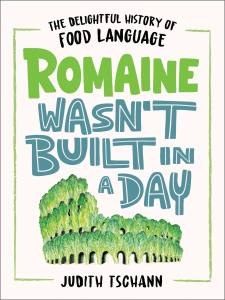Judith Tschann’s Fast Facts on the History of Food Language

Full of endless morsels of fascination for word nerds and foodies alike, Romaine Wasn’t Built in a Day will beguile history buffs, captivate crossword fiends, satiate Scrabble nerds, and feed our fondness for our two favorite pastimes: eating and talking. Read ahead for Judith’s eight fast facts about the the language of food.
1. Halibut means “holy butt” in Middle English.
In the Middle Ages, a kind of flatfish was called a butt, and hali meant “holy.” Halibut was often eaten on holy days when the flesh of four- and two-legged animals was forbidden.
2. Jug comes from a nickname for Joan, Joanna, or Jenny.
Perhaps the transfer of meaning – from jug as a woman’s nickname to jug as a container – arose from the association of beer and ale with those who made and served it. Historically, they were very often women.
3. Long ago, a symposium was a drinking party.
The word goes back to Greek sumpote meaning “fellow drinker,” from sum to sun, “together” + potes, “drinker”.
4. Precocious kids ripen early. They almost seem precooked.
The word precocious comes from Latin praecoquum, “early ripening”, from praecoquere, “to cook before.”
5. Ambergris, the highly-prized aromatic, spice, and aphrodisiac, comes from the gut of a whale.
Ambergris is a waxy glob formed in a sperm whale’s intestines from indigestible squid beaks. After being excreted and tossed around in the ocean, this whale of a turd transforms into an expensive commodity (now available in synthetic form).
6. Centuries ago, a cocktail signified an impure pedigree.
The tails of carriage and hunting horses were often cut – docked, so they stuck up like a cock’s perky tail. But the tail of a thoroughbred racehorse would not be cut. If a racehorse was found to have a cocktailed horse in it lineage, its pedigree was considered impure. By the twentieth century, when cocktail meant a mixed drink, it had lost its negative sense.
7. To a hungry etymologist, a person’s head is a cabbage with pasta, lentils and a piehole.
Many food words come from body parts, and vice versa. Cabbage meant “head” in Old French. The pasta called capellini means “fine hair,” and the pasta called orecchiette means “little ears.” Lens (of an eye) derives from the Latin word lentil, meaning “the seed of a leguminous plant,” and piehole is, of course, slang for the mouth.
8. Literally speaking, if you’re wearing seersucker, you’re wearing milk and sugar.
The word seersucker comes, via Hindi, from Persians šir o šakar, meaning “milk and sugar.” The phrase probably refers to the fabric’s alternating (milky) smooth and (sugary) bumpy stripes. British traders imported the striped linen or cotton fabric along with the word seersucker in the early eighteenth century, one of the many words that entered English as a result of the British colonialist period in India.
“A truly delightful smorgasbord of history and linguistics that kept us entertained—and made us hungry.”
—Apple Books
“Scrumptious…This book was meant to be devoured.”
—Roy Peter Clark, author of Murder Your Darlings
Romaine calm and read on for a deliciously detailed digest of food language throughout time from celebrated linguist and historian Judith Tschann that is guaranteed to “make you a hit at dinner parties” (New York Times).
Food and words—we rely on both to sustain our daily lives. We begin each morning hungry for nourishment and conversation, and our happiest moments and fondest memories are often filled with ample servings of both.
Food historian Judith Tschann celebrates this glorious intersection of linguistic and culinary affinities with Romaine Wasn’t Build in a Day, an irresistibly charming and deliciously decadent romp through the history of food words. On the hunt for the hidden stories behind hundreds of dishes and ingredients we take for granted, Tschann takes us on an expedition through the centuries and around the world, illuminating the ways in which language is always changing, ever-amusing, and entirely inseparable from culture, history, identity, and such as:
- pumpernickel, which literally means “Farting Nicholas”
- the surprising linguistic connection between alcohol and eyeliner
- and the fascinating travels of the word coffee across centuries and continents, attesting to the enduring allure of a cuppa joe
Full of endless morsels of fascination for word nerds and foodies alike, Romaine Wasn’t Built in a Day will beguile history buffs, captivate crossword fiends, satiate Scrabble nerds, and feed our fondness for our two favorite pastimes: eating and talking.
